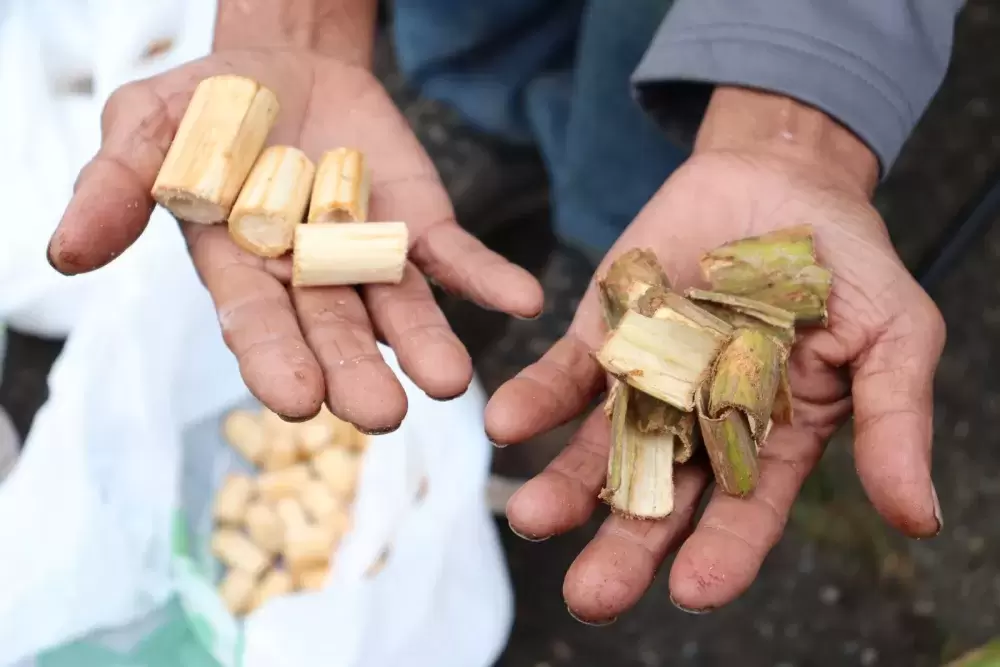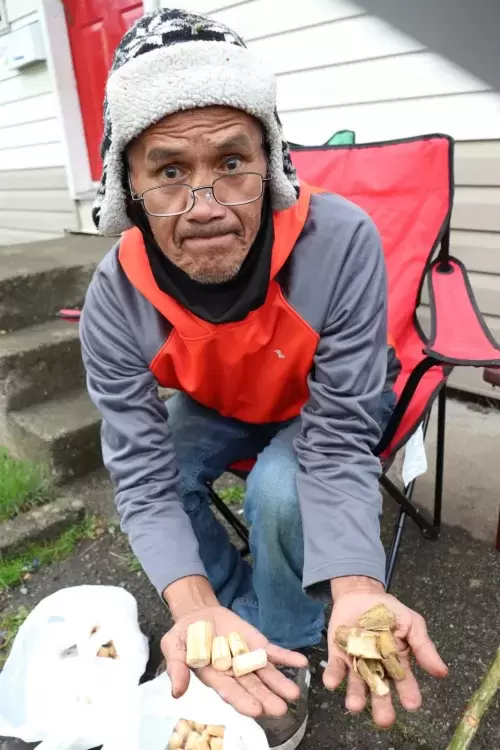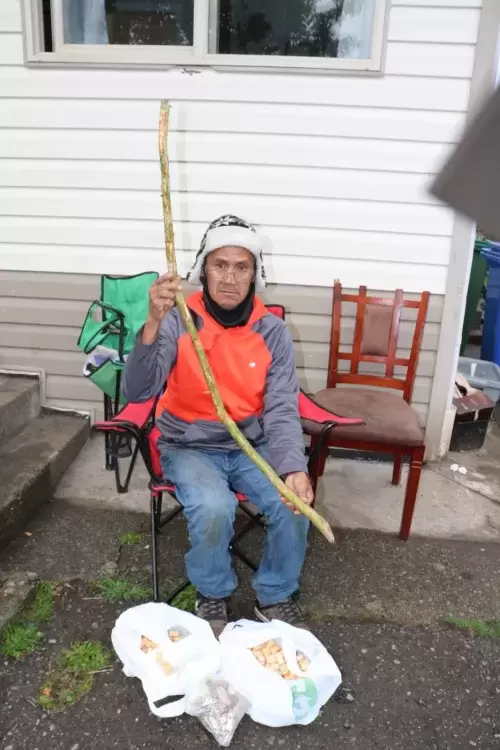With summer coming to an end, Stan Lucas of Hesquiaht is focusing his attention on harvesting seasonal medicinal plants. The husband, father and grandfather will ride his bike several kilometers over Sutton Pass along Highway 4 to find plants like devil’s club, wild crab apple trees and balsam trees.
On Sept. 22 he was working on devil’s club medicine, which he says is nearing the end of its season. Lucas sits outside of his home with a stick of devil’s club that he just harvested.
“Some people hang the stick over their door for three days,” he notes, as a form of protection.
His hands, calloused, scuffed and stained, show how hard he works to produce traditional medicine, which he shares freely with elders and children.
Lucas says it is important not to waste – to use every piece of the plant.
The woody stalk has an outer and inner bark which is peeled and boiled for several hours, if not for days.
“A weak brew can be used for colds, while stronger brew can be used to treat more serious illnesses like cancer,” he explains.
Lucas says most medicines are boiled for four days and sit for four days before using.
The soft, spongy, inner core of devil’s club is used to make pain cream to treat arthritis and muscle pain.
“This is the real medicine,” says Lucas after scooping out the soft, white pulp and squeezing it between his fingers.
Lucas says the cream made from devil’s club pulp opens your pores, allowing your skin to breathe.
The leaves, he says, can be used to treat arthritis or general body aches.
“You lay a giant devil’s club leaf on whatever hurts as you soak in a hot tub,” said Lucas.
Skunk cabbage leaves can be used the same way to treat muscle or arthritis pain. They can also be used to treat migraine headaches.
“You take the leaf and roll it between your hands,” Lucas says.
This crushes the leaf, breaking its surface to release plant juices.
“You cup the crushed skunk cabbage leaves to your nose and inhale it,” he says.
“Devil’s club is one of our strongest medicines passed down for generations,” stresses Lucas, adding that people must be very vigilant when working with medicinal plants.
Devil’s club has closely cropped spines covering almost every exposed surface of the plant, including the stems and the underside of the giant leaves. Most people wear gloves when handling it, but Lucas doesn’t.
“The needles sting but I like that,” he says, adding that the needles get into your skin and deliver medicine into your body. “I can move better – my arthritis.”
Having learned what he knows from elders from several different Nuu-chah-nulth nations, Lucas also learned of remedies that are no longer in use.
“Our people used to trap bees and let them sting us to treat pain. This is good if you’re not allergic,” he explains.
On the subject of allergies, Lucas plucked a couple of dandelion flowers from his lawn.
“We have medicine for allergies,” he shares. “Not many people know that dandelions are medicine. You take the root, dry it and grind it into a powder.”
He is aware that some believe that teachings of harvesting and producing Indian medicine should be kept secret, but he thinks it is important to share so that knowledge doesn’t get lost and, more importantly, because people need the medicine.
“I learned how to harvest plants when I was a young boy,” says Lucas, adding they only harvested what they needed, when they needed it.
Every season there is some form of medicinal plant that can be harvested.
“I’ve always liked working with traditional medicines. I know what season to get plants, how to get them and where to get them,” he adds.
Lucas brought out two bags of devil’s club medicine. One bag had the bark shavings, which will be boiled to make liquid medicine that he says is best for cancer.
“I used to chew the white inner bark when I was a little boy to avoid strep throat,” Lucas recalls.
His late father kept a big pot of devil’s club ‘tea’ brewing on the wood stove for days.
“He’d drink two or three cups in the morning and couple more throughout the day,” says Lucas.
His father lived to be an elder, losing his life in a fishing accident.
“The longer it boils, the more bitter it gets,” says Lucas, adding that it’s the bitterness that a medicine maker is after…the more bitter, the better the medicine.
The second bag had what he called “beads”. A stick of devil’s club was stripped of its bark, cut into small rounds and hollowed out. People wear the beads for protection, he said.
Lucas credits elders for teaching him what he knows. He returns the favor by supplying them with whatever medicines they need. For Lucas, it is important to share generously the gifts he was given.
“Lots of people don’t want to use Western medicine,” says Lucas. “Chemicals are the worst.”
“I am trying to teach my kids about this too,” he shares.
Lucas plans to head out again, hoping to get more devil’s club before its season is done.



